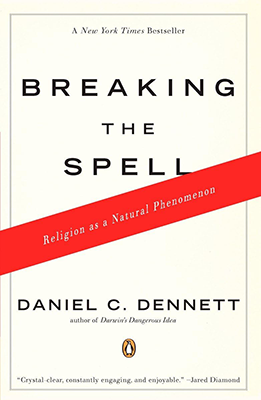Breaking The Spell
“Breaking the Spell: Religion as a Natural Phenomenon” by Daniel Dennett is a thought-provoking exploration into the nature of religion from a scientific and philosophical perspective. Here’s a summary of the key themes and arguments presented in the book:
Naturalistic Approach: Dennett approaches the study of religion as a natural phenomenon, similar to other aspects of human culture and behavior that can be understood through scientific inquiry. He seeks to apply empirical methods and evolutionary theory to understand the origins and persistence of religious beliefs and practices.
Exploring Belief: Dennett delves into the cognitive processes and psychological mechanisms that underlie religious belief. He examines how beliefs are formed, maintained, and transmitted within societies, emphasizing that religious beliefs can be analyzed and understood through the lens of cognitive science.
Evolutionary Perspective: Drawing on evolutionary biology and anthropology, Dennett explores hypotheses about the evolutionary advantages of religious beliefs and rituals. He discusses how religion might have provided social cohesion, promoted group cooperation, or helped individuals cope with existential anxieties and uncertainties.
Critique of Religion: While Dennett acknowledges the cultural and psychological benefits that religion may provide to individuals and societies, he also critiques aspects of religious belief that he considers harmful or irrational. He challenges the privileged status of religious beliefs in public discourse and calls for a more open and critical examination of religious ideas.
Freedom of Inquiry: Dennett argues for the importance of freedom of inquiry and intellectual honesty in discussing religion. He encourages scholars and the public to engage in respectful but rigorous examination of religious beliefs and practices, challenging taboos that hinder open dialogue.
Impact and Controversy: “Breaking the Spell” has sparked considerable debate among scholars, religious leaders, and the general public. Critics argue that Dennett oversimplifies or overlooks the deeper existential and spiritual dimensions of religion, while supporters applaud his efforts to bring scientific rigor to the study of religious phenomena.
Overall, “Breaking the Spell” is a provocative and insightful book that encourages readers to approach religion with a critical and scientific mindset, exploring its origins, functions, and implications within human societies.

